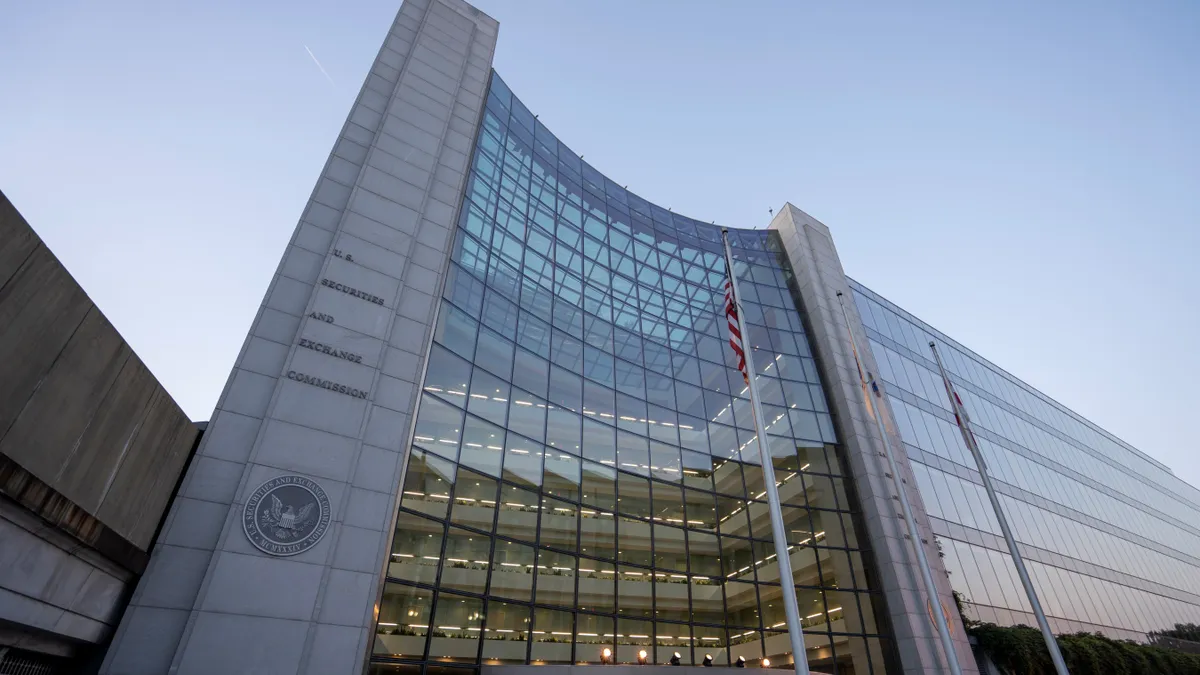Lawyers often grapple with the question of whether they’re best suited to practice at a law firm or as in-house counsel. For Courtney Posner, an investment attorney with Lowenstein Sandler, the clear answer has been both.
Posner began her career as an associate at Dewey & LeBoeuf, a New York firm that later dissolved in bankruptcy, before moving in-house as associate general counsel for PineBridge Investments, a global asset manager. In 2017, she joined hedge fund Echo Street Capital Management LLC as general counsel and chief compliance officer. In November 2023, Echo Street’s founders decided to return clients’ capital and close.
Posner joined Lowenstein Sandler in September. She spoke with Legal Dive Oct. 29 about her career path, why clients are so focused on “a very active rulemaking” Securities and Exchange Commission and how artificial intelligence is slowly creeping into clients’ fee discussions.
Editor’s note: Legal Dive’s conversation with Posner has been edited for clarity and length.

LEGAL DIVE: How did you get interested in becoming a lawyer and then focusing on investment and securities regulations?
POSNER: I started my legal career at a large New York City law firm, Dewey & LeBoeuf. I was given a project in the private equity funds group, and really enjoyed the work, really enjoyed the people, and so committed to that practice group. Everything flowed from there. In terms of how I decided to become a lawyer, I majored in psychology and economics in college, and was interested in taking the LSAT and thinking about law school. I had spoken to certain people who had already begun law school, and they were very positive about it.
I spent a little over four years at Dewey & LeBoeuf and then made the decision to go in-house to PineBridge. And that was a very easy, good transition. It was really sort of an extension of the work I had been doing at the law firm. I covered a group that did fund-of-funds investing and secondaries investing. I worked on fund formations, and I continued to work on doing investments in underlying funds.
In 2017 I had the opportunity to join Echo Street Capital Management as a general counsel and chief compliance officer. That was an ability to take a transferable skill set and apply it to something pretty new for me, being that Echo Street was a hedge fund.
Given that you’ve worked in-house and at more than one firm, what are some of the differences? And what would you advise somebody who's thinking about moving in-house?
At a firm, especially when junior, you are acquiring lawyering skills [and] analytical skills. You're learning your way around the documents, what they all mean, what their purpose is. And certainly, you're jumping in and advising clients as time goes on, but you're a little bit more removed.
A lot of the time, people make the decision to go in-house because they want to be closer to where certain decisions are made, see how businesses are actually operating, and how the legal advice plays into those operations. That was certainly what drove me, and that is a huge difference. Being in-house, you have to be a generalist, and you have to be ready to take whatever questions might come to you. But you’re in the flow.
You’re working with people who are not simply lawyers. You are working with people who come from different backgrounds and have different viewpoints. A lot of being in-house is really managing, consensus building, navigating the desires and goals of the stakeholders, and providing commercial advice that’s actionable from a legal perspective to meet objectives and get things done.
Is that a challenge? A company will assume you’re a good lawyer, but will also need business advice and a collaboration mindset. Is that asking for skills a lawyer might not have?
That was something I was worried about. You want to perform well, and you know that there is going to be a lot thrown at you. You develop an ability to get comfortable being uncomfortable. That's personal and professional growth. It’s always driven me in my career. It keeps things interesting. If you are a smart and capable person and you're intellectually curious, that’s a great environment for you. You’re going to keep pushing to learn about new things and deal with people who care about different things.
Being trained at a large law firm prepared me for that. It's just certain things are different. The pace of the work is different. You might have 25 discrete things you need to accomplish in a day, none of which is necessarily related to one another, while in-house, versus you could sit drafting a document for eight hours at a law firm.
Is one side preferential?
I can’t answer that now, because I just literally started here on Sept. 3, and I made the decision to come back to private practice for similar reasons in terms of my own professional growth that had taken me in-house 12 years ago.
I have challenges that I’ve never had before, where I’m in a position of business development, and flexing those muscles in terms of speaking about certain services that we can provide, and focusing on client happiness.
I think I'm uniquely situated to be in this role now and provide services to my in-house counterparts, being that I sat in that seat for 12-plus years and know what really mattered to me.
As part of your work in business development, does the topic of AI come up? Do clients ask if you’re using it and how? And if this is going to save them money?
Absolutely. We're exploring that here. It's going to be something that we certainly implement. People have different comfort levels with this, but my view is it’s not going anywhere and it will make everyone more efficient.
There will always need to be, of course, a human element to making sure that whatever the outputs are are appropriate and correct. I’ve been in a couple of meetings where clients would ask about it. It's been more of an internal discussion here, though it’s something that’s top of mind.
Is the tech at a place where lawyers are generally getting happy, or do you think it still has a long way to go?
I would have to say it probably has a little ways to go. People use it here for discrete things to help them — more of a one-off basis. It’s not fully integrated. People aren’t going to be super happy until they start using it more regularly.
What are some of the issues your clients are raising, as far as problems they’re having in regulation or other business areas?
We’ve come through a time where it’s been a very active rulemaking SEC. And so from a regulatory perspective — many of our clients are registered investment advisors — and there’s this ever-evolving environment of rulemaking and rules that are applicable to our clients. That’s always top of mind for them, and will continue that way for the foreseeable future. I think that people are always focused on cybersecurity, and that's something that when I was in-house that we viewed as both a general business risk but also a regulatory risk. The regulators are quite focused on that. But I would say the regulatory piece is probably top of mind for our clients.
Do you expect that there may be more financial liability coming from regulators in the future associated with cybersecurity incidents?
From an Advisers Act perspective, there’s an obligation to have cybersecurity policies and procedures. If people fall down on that, not necessarily have a breach, but if they fail to put adequate policies and procedures in place, and follow those procedures, they will have a problem from the regulator.
You mentioned an active SEC. There’s a lot of media attention around Gary Gensler and who might lead the SEC in a Harris or Trump administration. Do you have thoughts about what the SEC looks like in the next administration?
Depending on who wins, it could be very different. I think it could go in two very different directions. I do think that there will be somebody different than Gensler.
If Kamala Harris wins, do you think the SEC will largely be a continuation of the Biden administration’s approach?
Certainly it will remain active as it is today. I think that there will be a focus on regulation, getting in and reviewing advisors, and that will be a priority, certainly in a way that if Trump wins, perhaps it will be less so. I don't know if the rulemaking will necessarily be as aggressive as under Gensler, but it’s hard to know.
What’s the discussion around cost these days? Legal fees seem to rise annually, and clients are not happy with this inflation. Do you feel like it’s moderating?
I am pretty new, although I was on the other side of things not so long ago. I have sat through a couple of meetings and held a couple of meetings on my own where people have asked about proposals and negotiating certain engagement letters and whatnot. I am seeing clients attempt to push back, ask for discounts, ask for a freeze for a period of time before legal fees can increase.
I can only speak to our firm, and our firm is quite entrepreneurial and we view ourselves as partners with our clients. And we approach all of this through that lens. We are willing to think about alternative fee arrangements. We are willing to think about certain discounts where appropriate, the way we bill and the cadence of that depending on the type of work that we are bringing in. I think this is all standard stuff in the industry.
After the election outcome is known, does that set off a new round of legal work for companies trying to prepare for the incoming administration in January?
I don't know that it happens immediately in the investment management area. It could be the case where for certain clients there could be [international] trade-related changes that impact their vertical. In the (investments) space that I am in, the process is not quick. So yes, the administration could change, and certain rules could be repealed, and certain things could be proposed, but I think people will have time to get their ducks in a row, pending the outcome of these things.



















